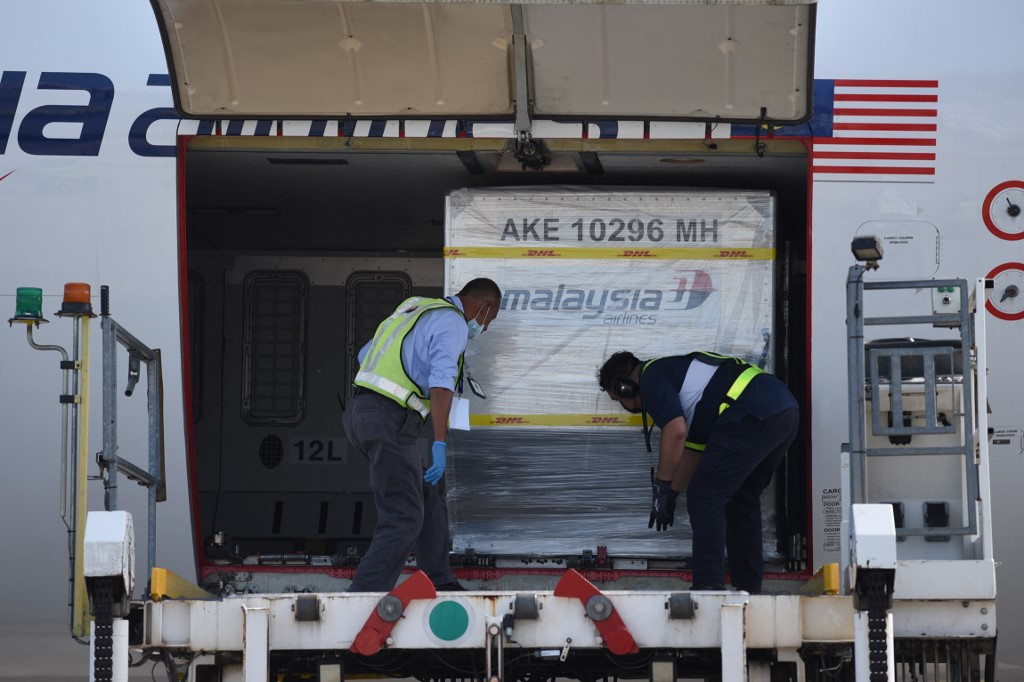Popular Reads
Top Results
Can't find what you're looking for?
View all search resultsPopular Reads
Top Results
Can't find what you're looking for?
View all search resultsMalaysia to stop using Sinovac vaccine after supply ends
Malaysia's inoculation drive will be largely anchored by the Pfizer-BioNTech mRNA vaccine moving forward, health minister Adham Baba told a news conference with other top ministry officials.
Change text size
Gift Premium Articles
to Anyone
 This handout photo from Malaysia's Department of Information taken and released on February 21, 2021 shows a cargo container (C) containing Malaysia's first shipment of Pfizer-BioNTech Covid-19 coronavirus vaccines being unloaded following its arrival at the Malaysia Airlines Berhad Cargo area near Kuala Lumpur International Airport (KLIA) in Sepang, outside Kuala Lumpur. (Agence France Presse/Handout)
This handout photo from Malaysia's Department of Information taken and released on February 21, 2021 shows a cargo container (C) containing Malaysia's first shipment of Pfizer-BioNTech Covid-19 coronavirus vaccines being unloaded following its arrival at the Malaysia Airlines Berhad Cargo area near Kuala Lumpur International Airport (KLIA) in Sepang, outside Kuala Lumpur. (Agence France Presse/Handout)
M
alaysia's health ministry on Thursday said the country will stop administering the COVID-19 vaccine produced by China's Sinovac once its supplies end, as it has a sufficient number of other vaccines for its program.
Malaysia's inoculation drive will be largely anchored by the Pfizer-BioNTech mRNA vaccine moving forward, health minister Adham Baba told a news conference with other top ministry officials.
The Southeast Asian country has secured about 45 million doses of the Pfizer-BioNTech vaccine, enough to cover 70 percent of the population, compared to 16 million doses of Sinovac's shot, the officials said.
"About half of the 16 million have already been distributed, so the rest will be used to cover second doses," Adham said.
"For those who have yet to be vaccinated, they will receive the Pfizer vaccine."
The government had previously said it had secured 12 million Sinovac doses, as part of a deal which would see state-linked firm Pharmaniaga carrying out a fill-and-finish process on the vaccine for local distribution.
The announcement to stop using Sinovac's inactivated virus vaccine comes amid increasing concern over its efficacy against new and more contagious variants of the coronavirus.
Read also: Drug regulator approves Pfizer-BioNTech vaccine for Indonesia after 50-million-dose deal
Neighbouring Thailand this week said it would use the AstraZeneca vaccine as a second dose for those who received the Sinovac shot, while Indonesia is considering a booster shot for those who received the two-dose Sinovac course.
Other vaccines approved in Malaysia include those of AstraZeneca, China's CanSino Biologic, and the Janssen vaccine of Johnson & Johnson.
Malaysia also plans on Friday to announce its decision on whether to add the vaccine of China's Sinopharm, officials said.
With 880,782 cases and 6,613 deaths so far, Malaysia has one of Southeast Asia's highest per-capita infection rates, but also one of its highest inoculation rates, with about 26 percent of its 32 million population receiving at least one dose of a COVID-19 vaccine.






